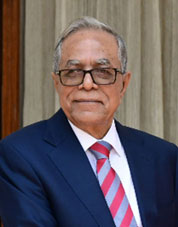Hamid, Md. Abdul
Hamid, Md. Abdul (b1944) Valliant Freedom Fighter, social worker, patron of education and culture, and President of The People’s Republic of Bangladesh (2013-2024). On 1 January 1944, Md. Abdul Hamid was born at Kamalpur village, upazila Mitamain, sub-division Kishoreganj (currently district) under the then Mymensingh district. His father's name was Haji Md. Tayeb Ali and mother was Tomijakhatun.

Md. Abdul Hamid passed his Matriculation from Niklee GC Pilot High School. After the completion of his Intermediate and BA from Kishoreganj Government Gurudayal College; he obtained LLB degree from the Dhaka Central Law College. Then he joined the Bar as a legal profession.
Abdul Hamid is beholden to a colourful as well as struggling life. His political life started with his joining the East Pakistan Chhatra League in 1959, when he was just a school student. He was actively involved in the 1962 anti-Sharif Commission Report student movement and got arrested. He was then a college student. In 1962-63, he was elected General Secretary of the Gurudayal College Student Union. In 1964, he founded the Kishoreganj sub-divisional branch of the Chhatra League, himself becoming its President. In 1965-66, he was elected Vice-President (VP) of Gurudayal College Student Union. During 1966-67, he was elected Vice-President of Mymensingh District Chhatra League. He was again arrested in 1968 on charge of giving leadership to student movement. Upon his release, he joined the Awami League in the next year. In the 1970 elections, he was elected to the Pakistan National Assembly as member on Awami League ticket from Mymensing-18 constituency. During the politically most turbulent month of March 1971, as per directive of Bangabandhu, he played a pivotal role in making the non-cooperation movement in Kishoreganj a total success, while mobilizing popular support for Bangladesh’s independence. On 17 March, he hoisted the fag of independent Bangladesh atop at Ratkhola ground in the presence of a huge crowd. On the receipt of telegraphic message of Bangabandhu’s formal declaration of independence in the early hour of 26 March, he built up barricades on the streets along with other measures in cooperation with rebel Bengali soldiers, police and masses as an endeavour to resist the impending advancement of the Pakistani army. Under his leadership, more than 11 crore of Pakistani Rupees were collected from three branches (Kishoreganj, Bhairab and Bajitpur) of National Bank of Pakistan for partially meeting the expenses of the Liberation War. Thereafter, he went to freedom fighters camp in Agartala, India. There he happened to meet with many people’s representatives coming from different areas. They held several meetings discussing war strategy. They also met with local people's representatives of India including the Rajjya [province/state] government. In the end of April, Md. Abdul Hamid entered Bangladesh area to collect youths for the Liberation War and returned to Balat of Meghalaya with a group of them. There he was appointed chairman of Youth Reception Camp. Preliminary selection of Freedom Fighters was made in the camp. In addition to such position, he was a member of the Meghalaya-based Zonal Administrative Council formed to steer the War of Liberation along with administering refudees. Furthermore, he was appointed Sub-sector Commander of Bangladesh Liberation Force - BLF (popularly known as 'Mujib Bahini') comprising the Sunamganj-Kishoreganj area. After the fulfillment of all duties and responsibilities vested in him, he finally returned to independent Bangladesh on 10 January 1972.
On his return from India, Abdul Hamid engaged himself in the reconstruction of the war-ravaged country locally. He was appointed Chairman of Kishoreganj Sub-division Relief and Rehabilitation Committee. In 1974, he was elected Vice-President of the Sub-division Awami League. After the gruesome killing of Bangabandhu in 1975, he was arrested and had spent nearly 4 years in prison during the Zia regime. He was set free in 1978. He was President of Kishoreganj District Awami League during 1978-2009. He served as President of Kishoreganj District Bar Association from 1990 to 1996.
Md. Abdul Hamid was elected Member of Parliament for 7 times (1970, 1973, 1986, 1991, 1996, 2001 and 2008) from Mymensign/Kishoreganj constituency. He was first elected Deputy Speaker (1996-2001), then Speaker (2001) of jatiya sangsad [House of the Nation or Parliament] during Sheikh Hasina's first government (1996-2001). During 2001-2006, he served as Deputy Leader of Opposition under Shekih Hasina. He was unanimously elected Speaker of the House for the second term (2009-2013) following awami league's victory in the December 2008 elections. After the death of President md zillur rahman on 21 March 2013, the same day Md. Abdul Hamid was elected uncontested in his place and sworn-in as president. On 24 April 2018, he was elected President for the second term (2018-2023).
Md. Abdul Hamid was a member of Executive Committee of Inter Parliamentary Union (IPU) and Commonwealth Parliamentary Association (CPA) while he was Deputy Speaker and Speaker. As a devoted social worker and a great patron of education, Md. Abdul Hamid has established 75 primary schools, 24 high schools and 3 colleges in his constituency and the adjoining areas. The name of Md. Abdul Hamid’s wife is Rasheda Khanam. This couple is blessed with 1 daughter and 3 sons. [Harun-or-Rashid]
Source Bangladesh Government website.
